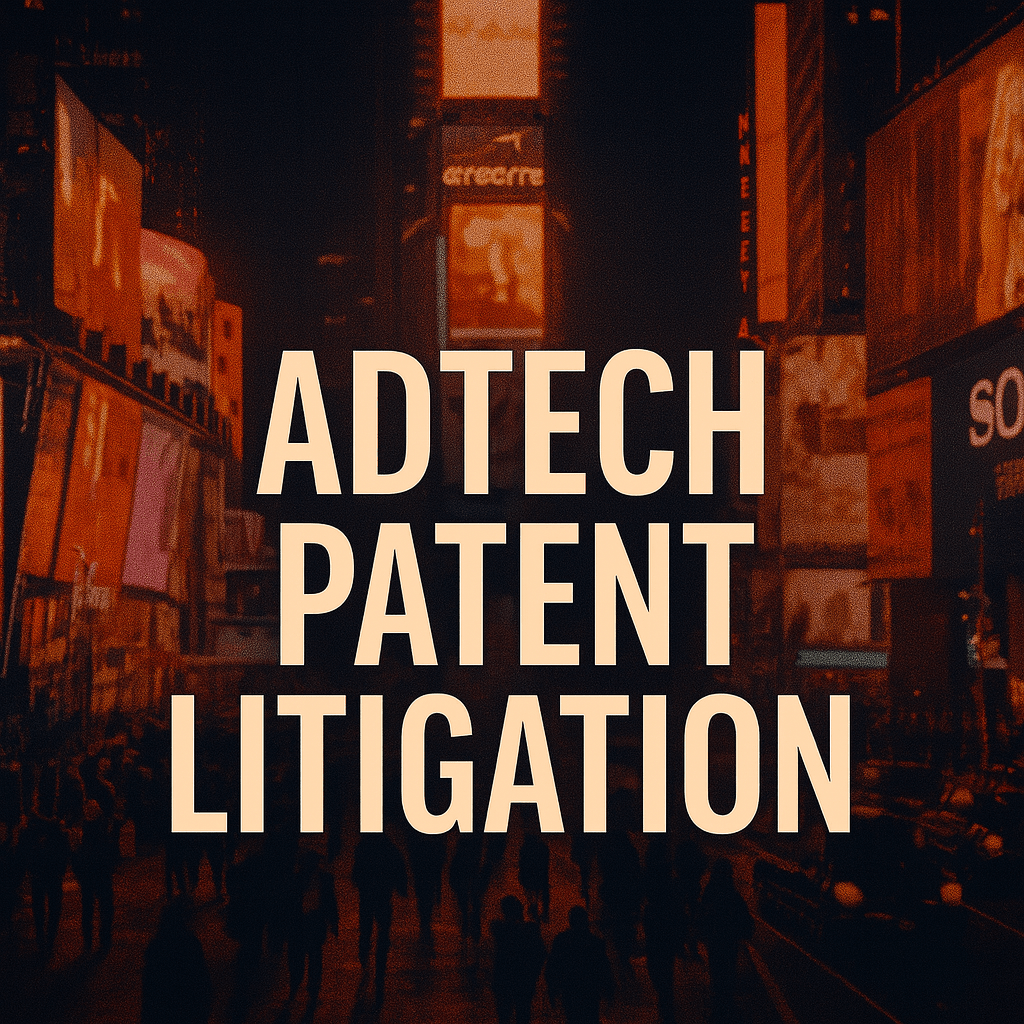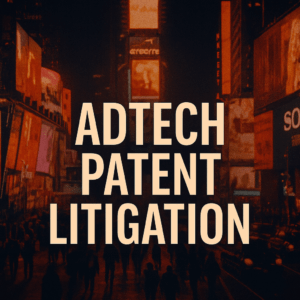The advertising technology industry has undergone dramatic transformation with real‑time auctions, AI‑driven targeting, cookie‑less tracking and programmatic platforms. With this shift has come an equally dramatic increase in patent assertions and litigation. For a startup operating in the AdTech space, adtech patent litigation is no longer a far‑off scenario—it is a real business risk that can sideline growth, scare off investors, and force unexpected licensing deals.
This article breaks down why patent litigation is growing in AdTech, what types of patents are being enforced, how startups can protect themselves, and how they can turn these legal dynamics into strategic advantages.
Why Are Patents Being Asserted Against AdTech Startups?
Several trends have converged to create a surge of patent litigation in the AdTech sector. First, legacy technology companies have built large patent portfolios over decades of online advertising innovation, and these companies—or sometimes patent assertion entities (PAEs)—are now actively enforcing those assets. For example, one small entity secured a verdict for nearly $122 million against a major online advertiser for infringement of digital advertising patents.
Second, technology startups have proliferated in the space, innovating quickly and sometimes using components or methods that are covered by broad older patents. Programmatic bidding, cross‑device tracking, audience segmentation and algorithmic optimization are all areas where patents exist, and startups using them may find themselves caught in infringement claims.
Third, the process for challenging patents has become more constrained. Inter partes review (IPR) by the U.S. Patent and Trademark Office (USPTO) once offered a faster path to invalidate weaker patents, but recent procedural changes have made IPRs less certain. Some commentators warn that this change emboldens assertion entities to file suits knowing the hurdles for invalidation are higher.
For startups in AdTech, this means you must assume that your architecture, your targeting engine, or your data‑matching logic might overlap with a patented method. The sooner you identify the risk, the more options you have for defence or licensing.
What Types of Patents Are Most Commonly Enforced in AdTech?
AdTech patent enforcement tends to focus less on hardware innovations and more on algorithmic, data‑flow or system patents. For instance, recently the Federal Circuit affirmed invalidity of claims that merely applied generic machine‑learning techniques without inventive concept under Section 101.
Some of the patent categories to watch include:
- Real‑time bidding and ad‑exchange algorithms
- Cross‑device user matching and attribution technologies
- Contextual or behavioural audience segmentation systems
- Automated optimization engines for ad placement
- Data collection and identity resolution methods
When a startup accepts that its solution may implicate one of these patent categories, it becomes clear that adtech patent litigation risk is baked in. The cost to defend can run into the millions, the distraction can derail product release, and even settlements may impose onerous licensing fees.
How Can Startups Minimise Their Patent Litigation Risk?
A proactive strategy is essential. Startups should build an IP risk‑mitigation plan even before product launch. Key steps include conducting a freedom‑to‑operate (FTO) investigation, filing your own patent applications (even provisionals), auditing your codebase and third‑party modules, and building a defensive reserve of prior art or documentation.
While much of this might sound like “legal cost centre” work, the opposite is true: investors will ask about your IP exposure during due diligence, acquirers will require clean patent portfolios, and insurers may raise premiums for companies with known litigation risk.
In addition, startups should monitor enforcement activity in the AdTech space. For example, a wave of recent lawsuits by entities targeting publishers for ad refreshing and lazy‑loading tech highlights how adtech patent litigation is evolving to target adjacent players, not just core bidders or ad‑networks. Business Insider
 What Should You Do If You Receive a Patent Infringement Notice?
What Should You Do If You Receive a Patent Infringement Notice?
Receiving a “cease and desist” letter or a complaint for patent infringement is stressful, but it doesn’t always mean the end of your business. What matters is how you respond. First, treat the claim seriously, seek counsel immediately, and do not ignore the dispute. The cost of delay often exceeds the cost of early engagement.
Your attorney should evaluate whether the asserted claims are valid, whether your system genuinely infringes, whether prior art exists and whether settlement or licensing is the best strategic path. Sometimes the best outcome is to negotiate a licence, sometimes to invalidate the patent via IPR or declaratory judgment, and sometimes to adjust your product architecture to avoid the claim.
One major example: Google prevailed in a recent appeal that invalidated advertising‑technology patents asserted by Impact Engine. The Federal Circuit affirmed that overly broad claims covering generic advertisement display techniques can be invalidated. For startups, this case shows there is hope—but only if you have proper legal strategy in place early.
Can Patent Litigation Ever Be a Strategic Advantage for Startups?
Yes—if approached thoughtfully, patent rights can be more than a defence; they can become an offensive tool. Filing patent applications provides leverage in investor discussions, bargaining power in partnerships and potential protection in acquisition scenarios. When a startup holds its own patent portfolio in an AdTech domain, it signals credibility.
Moreover, as enforcement activity increases, some startups view patents as a deterrent or as a negotiation chip. When a startup has demonstrable patent filings aligned with its technology stack, it may reduce the risk that a competitor will target it—or it may position the company to cross‑license rather than pay a licence fee.
But this strategy only works if the patent claims are well drafted, technically sound, commercial, and aligned with your product roadmap. A weak patent can become a liability, not an asset.
Best Los Angeles AdTech Startup Attorney
If you are building an AdTech platform, exchanging data across devices, innovating on audience segmentation or bidding systems, then you must treat patent risk as part of your core business planning. It starts with a startup‑level IP audit, a defence budget, and credible patent strategy.
Before you raise funds, sign a partnership or launch your product, ask:
- Have we done a freedom‑to‑operate check?
- Do we know where our code overlaps with existing patents?
- Have we filed provisional patents aligned to our roadmap?
- Can we respond to an enforcement threat in 90–180 days without shutting down?
- Are our investors comfortable with our IP position?
Failure to answer these questions may lead you into the zone of adtech patent litigation—and that is a zone streamed with risk, cost and disruption.
If your startup needs legal strategy around AdTech IP, request investor due‑diligence support, patent assessment, or defence planning now. Schedule your confidential consultation with L.A. Tech and Media Law Firm or use our secure contact form.
David Nima Sharifi, Esq., founder of the L.A. Tech and Media Law Firm, is a nationally recognized IP and technology attorney with decades of experience in M&A transactions, startup structuring, and high-stakes intellectual property protection, focused on digital assets and tech innovation. Quoted in the Wall Street Journal and recognized among the Top 30 New Media and E-Commerce Attorneys by the Los Angeles Business Journal, David regularly advises founders, investors, and acquirers on the legal infrastructure of innovation.
Schedule your confidential consultation now by visiting L.A. Tech and Media Law Firm or using our secure contact form.



